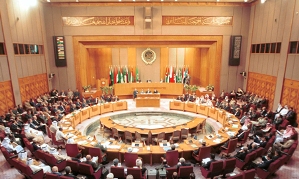 BEIRUT, Lebanon — The Arab League approved tough economic sanctions against Syria on Sunday because of its violent crackdown against antigovernment protesters, an unprecedented step against an Arab country.
BEIRUT, Lebanon — The Arab League approved tough economic sanctions against Syria on Sunday because of its violent crackdown against antigovernment protesters, an unprecedented step against an Arab country.
The sanctions were believed to include the suspension of commercial flights to Syria from Arab countries, a travel ban on officials and politicians, a halt to all dealings with the Syrian central bank and the cessation of all Arab projects in Syria.
The finance ministers drafted the sanctions on Saturday at a meeting in a hotel in the Cairo suburbs rather than the league’s headquarters in Tahrir Square, the scene of clashes last week between security forces and protesters seeking to hasten civilian rule in Egypt.
They were approved by the group’s foreign ministers on Sunday.
The sanctions will be another blow to the Syrian economy, which is already suffering from sanctions by the European Union and the United States.
Syria depends on its Arab neighbors for half of its exports and a quarter of its imports. Its two most vital sectors, tourism and oil, have ground to a halt in recent months.
In a letter to the league on Saturday, Syria’s foreign minister, Walid al-Moallem, accused the organization of seeking to turn the Syrian crisis into an international one.
The vote on Sunday was scheduled after Damascus said it would not admit Arab civilian and military observers into Syria to oversee a peace agreement. Syria had accepted the agreement on Nov. 2 to end more than eight months of bloodshed that has killed, according to the United Nations, more than 3,500 people.
Reactions from Syria to the sanctions varied with many worried that they would mostly hurt the poor and the middle class, further decreasing their income, while the interests of the business class and the elite would remain protected.
“I think it is time the world realized that economic sanctions are not affecting anyone but the Syrian people,” said a 23-year-old resident from Damascus who did not want to be identified for fear of reprisal. “Those who couldn’t afford buying bread, now can’t afford even smelling bread.”
Others hoped that the sanctions would push the business class and the elite in Syria’s two biggest cities, Damascus and Aleppo, to participate in the opposition against the government of President Bashar al-Assad. The upper class has so far remained largely quiet since the uprising began in March.
Violence in Syria continued throughout the weekend and the Syrian Observatory for Human Rights, an opposition rights group operating in exile, reported clashes between army defectors and security forces loyal to the government in northwestern and central Syria. At least 10 people were killed Sunday across the country, the group reported.
The group said that at least 27 civilians had been killed Saturday, most of them in the central city of Homs, where clashes between the army and defectors have been quite regular. In addition, 15 army defectors and 12 soldiers and security personnel during an attack on a military vehicle in northwestern Syria, the group said.
NYT

Leave a Reply
You must be logged in to post a comment.